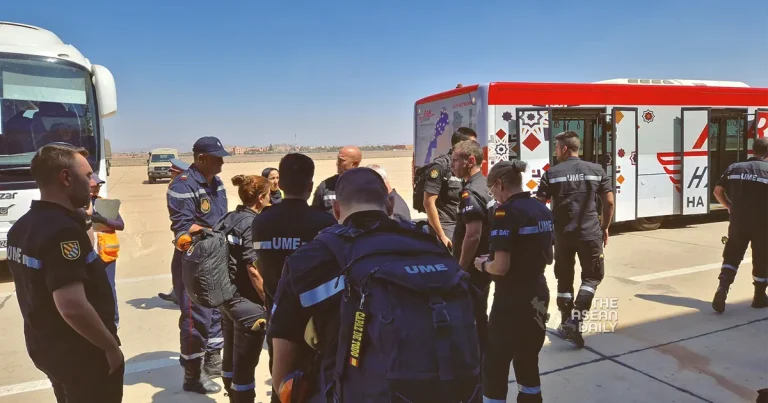11-9-2023 (MARRAKESH) Moroccan rescuers, aided by international teams, faced a desperate race against time on the third day after the country’s strongest-ever earthquake, as they dug through the rubble of mountain villages in search of survivors. The 6.8-magnitude quake struck the Atlas mountains late on Friday, southwest of the popular tourist destination of Marrakesh. The latest official figures reveal that the earthquake claimed the lives of over 2,100 people and left more than 2,400 injured, many of them seriously.
On Sunday, Rabat announced that it had accepted offers of aid from four nations, with several other countries expressing their willingness to provide assistance. The Moroccan interior ministry stated that it had responded positively “at this stage” to offers from Spain, Britain, Qatar, and the United Arab Emirates to send search and rescue teams. The ministry emphasized the importance of coordination and noted that only four offers had been accepted so far to avoid counterproductive efforts.
France, led by President Emmanuel Macron, has expressed its readiness to provide aid as soon as Morocco requests it. French Foreign Minister Catherine Colonna stated on Monday that Morocco, being a sovereign country, would organize the aid efforts. In a show of support, France released €5 million (US$5.4 million) to assist non-governmental organizations already operating in Morocco.
A Qatari aid flight, carrying rescue vehicles and other essential supplies, departed from Al-Udeid airbase outside Doha on Sunday evening. Spain, on the other hand, dispatched 86 rescuers and eight search dogs to assist in the search and rescue operations in the affected areas. Spanish Defense Minister Margarita Robles emphasized the criticality of the initial hours and stated that Spain would provide whatever assistance was required to locate survivors buried under the debris.
The earthquake devastated entire villages in the foothills of the Atlas mountains, where Moroccan civilian rescuers and armed forces have been tirelessly searching for survivors and recovering the bodies of the deceased. Many of the houses in these remote mountain villages were constructed using mud bricks.
While foreign teams start arriving, Moroccan authorities have set up emergency shelters, and bright yellow tents can be seen along the road leading to Tikht, a village that has been virtually destroyed. Government civil protection service members were seen carrying camp beds towards the tents, and non-profit organizations were present in the area to assess the needs of the affected population. Previously home to at least 100 families, Tikht now lies in ruins, with timber, masonry, broken plates, shoes, and remnants of intricate rugs scattered throughout. Mohssin Aksum, 33, who had family in the village, lamented the loss, saying, “Life is finished here. The village is dead.”
In an inspiring show of solidarity, citizens flocked to hospitals in Marrakesh and other locations to donate blood for the injured. Members of Morocco’s national football team were among the donors. Volunteers also mobilized to provide food and essential goods to the earthquake victims, as there were complaints of a slow response from the authorities. Mohamed Belkaid, a dedicated volunteer, urged everyone to lend a helping hand, including the absent authorities.
The education ministry announced the suspension of school classes in the worst-hit villages of Al-Haouz province, the epicenter of the quake. The historic medina of Marrakesh, with its labyrinthine alleyways, suffered significant damage, with piles of rubble and collapsed buildings in the UNESCO World Heritage site.
Dozens of people opted to sleep outdoors overnight in the modern quarter of Marrakesh, some finding rest on the median strip of Mohamed VI Avenue, while others sought refuge at the foot of their parked cars.
At the United Nations Human Rights Council session in Geneva, a minute’s silence was observed for the victims of the devastating earthquake. Gambia’s ambassador, Muhammadu Kah, proposed the tribute, emphasizing the collective responsibility of humanity.
This earthquake marks the deadliest incident in Morocco since the 1960 Agadir earthquake, which claimed the lives of at least 12,000 people.




